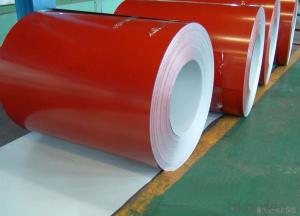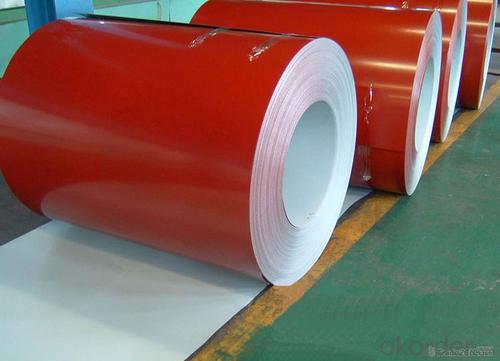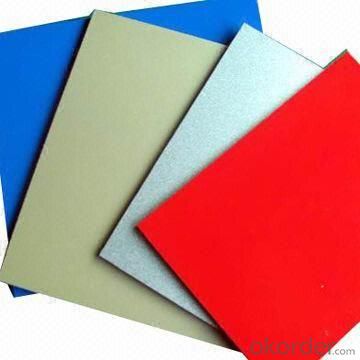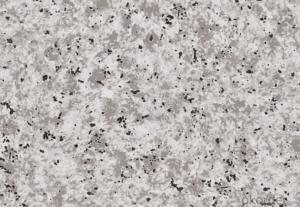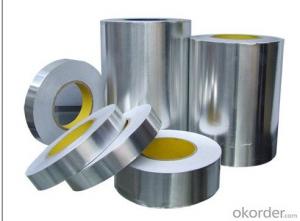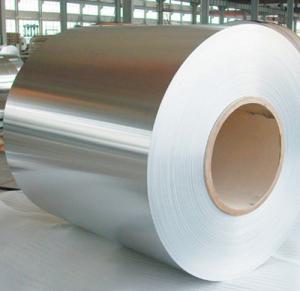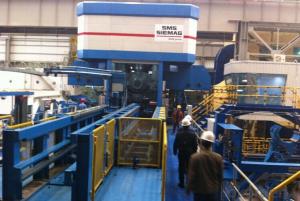Aluminum Foil Coil - Stone Power Coated Aluminum Coil
- Loading Port:
- Shanghai
- Payment Terms:
- TT OR LC
- Min Order Qty:
- 8 m.t.
- Supply Capability:
- 2000 m.t./month
OKorder Service Pledge
OKorder Financial Service
You Might Also Like
Specification
Structure of Aluminium Stone Power Coated in Coil Form:
Coated aluminum coil/sheet are of a wide range of colors, which gives wonderful appearance no matter in residential and commercial constructions of great exhibition centers.
The coated aluminum coil/sheet have been widely used in the fields of construction and decoration( garage doors, ceiling etc.), electronic appliances, lighting decoration, air-condition air pipes, sandwich panels and drainages etc.
Main Features of Aluminium Stone Power Coated in Coil Form:
1) High flexibility
2) Impact resistance
3) Excellent weather-proof durability
4) Anti-ultraviolet
5) High erosion resist
Images of the Aluminium Stone Power Coated in Coil Form:
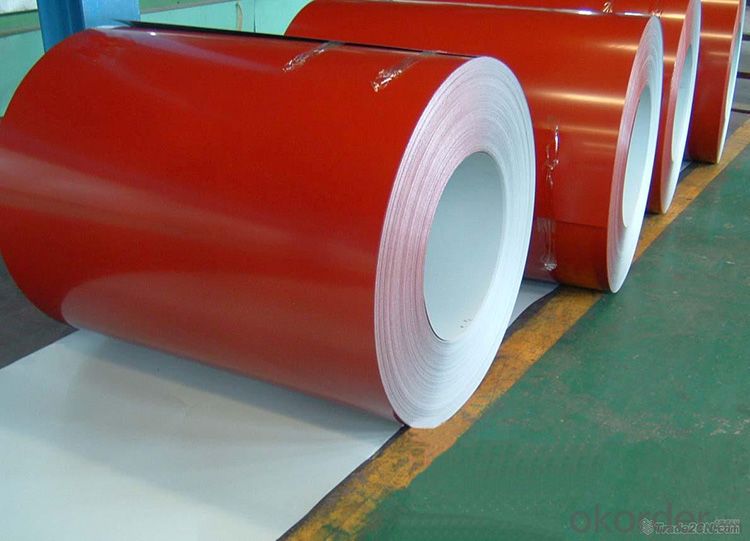
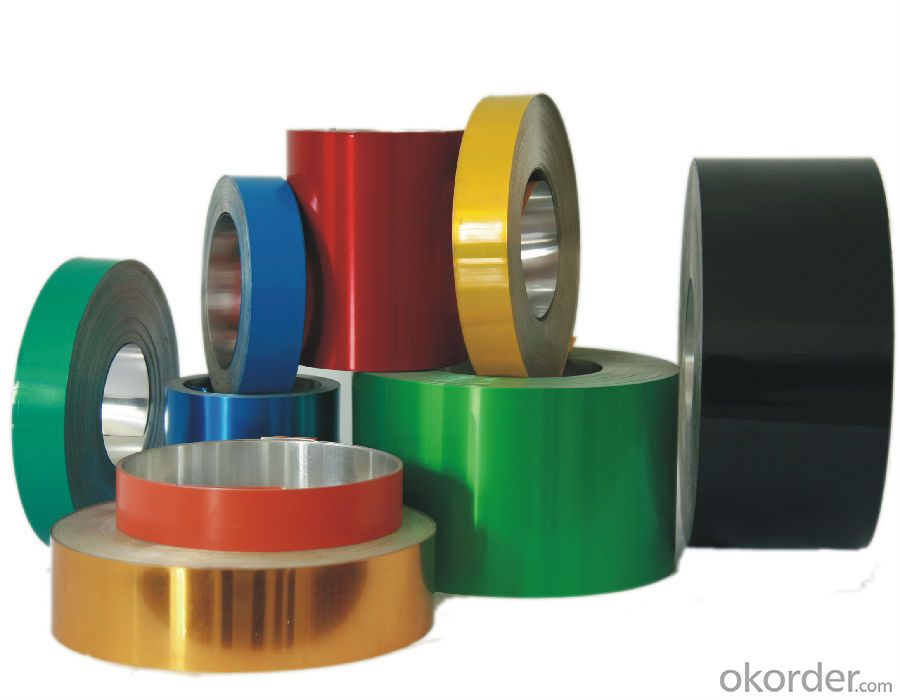
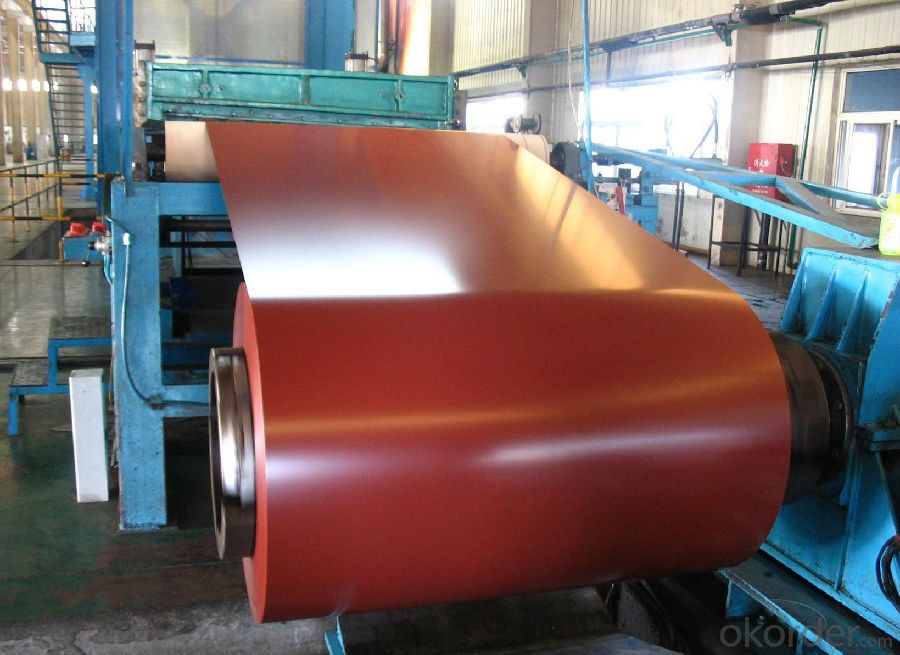
Aluminium Stone Power Coated in Coil Form Specification:
Alloy | A1100,A3003,A1050,A8011 etc |
Temper | H16,H18,H24 |
Thickness | From 0.024mm to 1.2mm |
Width | Standard width:1240mm |
Special width:1300mm,1520mm,1570mm,1595mm | |
Diameter | Standard dia:1200mm |
Interior dia:150mm,405mm,505mm | |
Weight | 2.5 T/coil,3.0 T/coil |
Coating | PE, PVDF, AC |
Surface | Embossed, mill finish, coated |
Color | AS to code RAL |
Gloss | 10-90%(EN ISO-2813:1994) |
Coating Thickness | PE: more than 18 micron |
PVDF: more than 25 micron | |
Coating Hardness (pencil resistance) | More than 2h |
Coating adhesion | 5J(EN ISO-2409:1994) |
Impact Resistance | No peeling or cracking(50 kg/cm,ASTMD-2794:1993) |
Flexibility (T-bend) | 2T |
MEK resistance | More than 100 |
FAQ Aluminium Stone Power Coated in Coil Form:
a.What is monthly capacity
---CNBM is one stated own company and our monthly capacity is about 2000tons.
b. Now which countries do you export your goods?
---Now we export to South East Asia,Africa, North America,South America ect.
- Q: How are aluminum coils used in the automotive industry?
- Aluminum coils play a crucial role in the automotive industry due to their numerous advantages over traditional materials. These coils are widely used in various parts and components of vehicles to enhance performance, improve fuel efficiency, and reduce overall weight. One of the primary applications of aluminum coils in the automotive industry is in the manufacturing of heat exchangers, such as radiators and condensers. Aluminum's excellent thermal conductivity allows for efficient heat transfer, helping to regulate the engine temperature and optimize its performance. By using aluminum coils in heat exchangers, vehicles can achieve better cooling efficiency, which is essential for preventing engine overheating and maintaining optimal operating conditions. Additionally, aluminum coils are used in the production of air conditioning systems, particularly in the condenser and evaporator units. These coils provide excellent heat exchange capabilities, allowing for efficient cooling or heating of the vehicle's interior. As a result, vehicles equipped with aluminum coil-based air conditioning systems can provide a comfortable environment for passengers while minimizing energy consumption. Moreover, aluminum coils are utilized in the construction of lightweight body panels and structural components, such as doors, hoods, roofs, and chassis. Aluminum's high strength-to-weight ratio makes it an ideal material for reducing the overall weight of vehicles without compromising structural integrity. This weight reduction leads to improved fuel efficiency, reduced emissions, and enhanced performance, including acceleration, handling, and braking. Furthermore, aluminum coils find application in the production of electrical systems in automobiles. Due to their excellent electrical conductivity, these coils are used in wiring harnesses, connectors, and other electrical components. The use of aluminum coils in these systems ensures efficient transmission of electrical signals and reduces the overall weight of the vehicle, contributing to improved fuel economy. In summary, aluminum coils are extensively utilized in the automotive industry for various applications, including heat exchangers, air conditioning systems, body panels, and electrical components. Their exceptional properties, including thermal conductivity, strength-to-weight ratio, and electrical conductivity, enable automakers to produce lighter, more efficient, and environmentally friendly vehicles.
- Q: This question asks for a comparison of the pros and cons associated with the use of aluminum coils.
- <p>Aluminum coils offer several advantages, including high thermal conductivity, which makes them efficient for heat transfer applications. They are lightweight and corrosion-resistant, which enhances their durability and reduces maintenance needs. Additionally, aluminum is a cost-effective material compared to other metals like copper. However, there are disadvantages such as lower strength compared to steel, which may limit its use in high-stress applications. Aluminum also has a higher coefficient of expansion, which can lead to issues in precision applications. Lastly, while it is recyclable, the recycling process can be energy-intensive.</p>
- Q: Are there any specific maintenance requirements for aluminum coils?
- Yes, aluminum coils require regular maintenance to ensure optimal performance and longevity. Some specific maintenance requirements for aluminum coils include cleaning them regularly with a mild detergent and water solution, removing any debris or dirt that may accumulate on the coils, inspecting for any signs of corrosion or damage, and ensuring proper airflow around the coils by keeping the surrounding area clear. Additionally, it is important to schedule professional maintenance and tune-ups to check for refrigerant leaks or any other issues that may affect the performance of the aluminum coils.
- Q: What are the potential applications of coil-coated aluminum coils?
- Coil-coated aluminum coils have a wide range of potential applications due to their excellent properties and versatility. Some of the key potential applications of coil-coated aluminum coils include: 1. Construction and Architecture: Coil-coated aluminum coils are widely used in the construction industry for various applications such as roofing, wall cladding, facades, and decorative elements. The coils can be easily formed, cut, and shaped to meet specific design requirements, while the coil coating provides durability, weather resistance, and color retention. 2. Transportation: Coil-coated aluminum coils find extensive use in the transportation industry, especially in the manufacturing of automobiles, buses, trains, and aircraft. The lightweight nature of aluminum makes it an ideal choice for reducing fuel consumption and improving energy efficiency. Additionally, the coil coating enhances the corrosion resistance, aesthetics, and overall durability of the aluminum coils. 3. Appliances and Electronics: Coil-coated aluminum coils are commonly used in the manufacturing of appliances and electronics such as refrigerators, air conditioners, ovens, and televisions. The coil coating provides a protective layer that prevents corrosion and extends the lifespan of the products. Furthermore, the aesthetic appeal and color options available in coil-coated aluminum coils contribute to the overall design and aesthetics of appliances and electronics. 4. Signage and Displays: The versatility and visual appeal of coil-coated aluminum coils make them a popular choice for signage and displays. The coil coating enhances the durability, weather resistance, and color vibrancy of the aluminum, making it suitable for both indoor and outdoor applications. Whether it's large billboards, shop signs, or exhibition displays, coil-coated aluminum coils offer a cost-effective and visually appealing solution. 5. Packaging: Coil-coated aluminum coils are extensively used in the packaging industry for various applications such as cans, containers, and lids. The coil coating provides a protective layer that prevents the aluminum from reacting with the packaged contents, ensuring product integrity and safety. Additionally, the lightweight nature of aluminum makes it an eco-friendly choice for reducing packaging waste. 6. Energy and Solar: Coil-coated aluminum coils are increasingly being used in the energy and solar industry. The lightweight and corrosion-resistant nature of aluminum make it an ideal material for manufacturing solar panels and energy-efficient systems. The coil coating further enhances the durability and weather resistance of the aluminum, ensuring long-term performance in various environmental conditions. Overall, the potential applications of coil-coated aluminum coils are vast and diverse, ranging from construction and transportation to appliances, signage, packaging, and energy industries. The combination of excellent properties, such as lightweight, durability, weather resistance, and aesthetic appeal, make coil-coated aluminum coils a preferred choice in numerous sectors.
- Q: What is the thermal conductivity of aluminum coils?
- Compared to other metals, aluminum coils exhibit a relatively high thermal conductivity. With approximately 237 W/m·K, aluminum possesses excellent heat conduction capabilities. This particular attribute renders aluminum coils well-suited for situations necessitating efficient heat transfer, like heat exchangers or air conditioning systems. The remarkable thermal conductivity of aluminum enables rapid and effective dissipation of heat, thereby guaranteeing optimal performance and energy efficiency across diverse industrial and residential environments.
- Q: Can aluminum coils be used in HVAC systems?
- Indeed, HVAC systems can utilize aluminum coils. In actuality, aluminum coils are gaining popularity in the HVAC sector due to their myriad advantages. When compared to conventional copper coils, aluminum coils exhibit superior corrosion resistance and can endure severe weather conditions, rendering them optimal for outdoor units. Furthermore, their lighter weight facilitates easier installation and transportation. Moreover, aluminum coils are more economical and eco-friendly, as aluminum is highly recyclable. Overall, aluminum coils provide enhanced efficiency, durability, and cost-effectiveness, rendering them a viable option for HVAC systems.
- Q: Aluminum silicate felt fiber needle blanket noise reduction?
- Aluminum silicate needled blanket belongs to the porous material, porosity higher than ninety-six percent in noise reduction has an absolute advantage, because the aluminum silicate needled blanket belongs to soft products, the lack of stress in the industrial application, so there is no large-scale promotion, mainly used in the silencing device of heavy trucks, trucks and cars.
- Q: Is it possible to utilize an aluminum coil as a light source?
- <p>Aluminum coil itself cannot be used as a light source. Aluminum is a good conductor of electricity but does not emit light when electrified like certain materials can. To create light, materials like tungsten in incandescent bulbs or phosphors in fluorescent lights are used. Aluminum coils can, however, be used in conjunction with other components in lighting fixtures, such as in heat sinks to dissipate heat from LEDs, but they do not produce light directly.</p>
- Q: How do aluminum coils contribute to thermal insulation in buildings?
- Aluminum coils contribute to thermal insulation in buildings in several ways. Firstly, aluminum is an excellent conductor of heat, meaning it can effectively transfer heat away from the building's interior. This allows for efficient cooling during hot summer months, as the aluminum coils can absorb and dissipate the heat, preventing it from entering the building. Secondly, aluminum coils can be integrated into HVAC systems to regulate the temperature inside the building. By circulating cool air through the coils, the aluminum helps to maintain a comfortable temperature, reducing the need for excessive energy consumption. Additionally, aluminum coils can be used as part of an insulation system known as radiant barrier insulation. This involves placing reflective aluminum foil on the inside of walls, roofs, or attics, which helps to reflect radiant heat back towards its source. This prevents the transfer of heat into the building, keeping it cooler in the summer and reducing the need for air conditioning. Moreover, aluminum coils are lightweight and easy to install, making them a cost-effective choice for thermal insulation in buildings. They can be easily shaped and fitted into various spaces, ensuring optimal coverage and maximum thermal efficiency. Overall, aluminum coils play a crucial role in thermal insulation by effectively dissipating heat, regulating temperature, and reflecting radiant heat. Their versatility and efficiency make them a valuable component in creating energy-efficient and comfortable environments within buildings.
- Q: What are the elements and compounds that make up aluminum coils?
- <p>Aluminum coils are primarily composed of the element aluminum (Al), which is a lightweight, silvery-white, and ductile metal. Pure aluminum is relatively soft, so it is often alloyed with other elements to improve its strength and durability. Common alloying elements include copper, magnesium, manganese, silicon, and zinc. These elements can enhance properties like strength, formability, and resistance to corrosion. The specific composition of an aluminum coil can vary depending on the alloy type and the intended application, but the primary component will always be aluminum.</p>
Send your message to us
Aluminum Foil Coil - Stone Power Coated Aluminum Coil
- Loading Port:
- Shanghai
- Payment Terms:
- TT OR LC
- Min Order Qty:
- 8 m.t.
- Supply Capability:
- 2000 m.t./month
OKorder Service Pledge
OKorder Financial Service
Similar products
Hot products
Hot Searches
Related keywords
